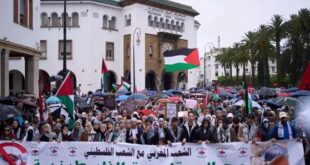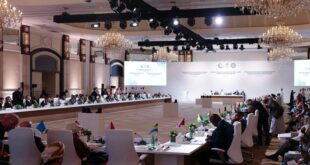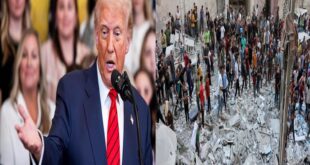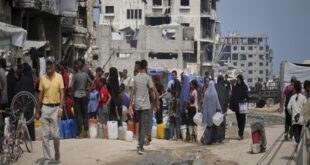
The Sudanese military leader who took power in a bloody coup has said he is keeping the deposed prime minister detained at the general’s personal residence “for his own safety”, as concerns mount over the wellbeing of senior arrested officials.
The prime minister, Abdalla Hamdok, and other ministers have not been seen since their detention and there have been international demands for their immediate release. They were seized by security forces loyal to general Abdel Fattah al-Burhan early on Monday and remain missing.
On Tuesday Hamdok’s office, in a message on its official Facebook page, called for people to take to the streets and conduct acts of civil disobedience, as it voiced concern over his safety and that of the other missing ministers.
Burhan denied that the army takeover amounted to a coup and said Hamdok was being kept at the general’s house “for his own safety” but was in good health and would be allowed to return to his own home later in the day.
Ahead of a closed-door meeting of the security council on Tuesday UN chief António Guterres assailed what he called “an epidemic of coup d’états” and urged the security council to act to effectively deter them.
“The Sudanese people have shown very clearly their intense desire for reform and democracy,” the secretary general told reporters as he again condemned the Sudanese army’s seizure of power and urged all parties to exercise “maximum restraint”.
“My appeal, obviously, is for – especially the big powers – to come together for the unity of the security council in order to make sure that there is effective deterrence in relation to this epidemic of coup d’états,” Guterres added. “We have seen that effective deterrence today is not in place.”
Abdalla Hamdok and other ministers have not been seen since Abdel Fattah al-Burhan took power in bloody coup
The situation in the capital, Khartoum, and its twin city, Omdurman, remained tense after at least 10 people were killed in protests that followed the coup d’etat.
Burhan appeared to strike a more defensive note as he attempted to explain why he had seized power, perhaps in a message aimed at western sentiment as the US, UK and Norway described the coup as a “betrayal of the revolution, the transition, and the legitimate requests of the Sudanese people for peace, justice and economic development”.
“The whole country was deadlocked due to political rivalries,” Burhan told a televised news conference. The experience during the past two years has proven that the participation of political forces in the transitional period is flawed and stirs up strife.”
“Yes, we arrested ministers and politicians, but not all of them,” Burhan added.
Although Burhan promised again that the military would continue with Sudan’s political transition, the country’s experience from long periods of previous military rule puts those claims in doubt.
The coup ends a period of tense power-sharing between civilian and military leaders, which has faltered in recent months as negotiations between opposition political factions have broken down.
Hundreds of thousands of pro-democracy demonstrators have taken to the streets of Khartoum and other major cities demanding full civilian rule, days after a sit-in was launched calling for a return to military government.
Commenting on talks over the weekend – held immediately before the coup – between Sudan’s parties with the US envoy Jeffrey Feltman, Burhan attempted to place the blame on Hamdok for refusing to compromise with generals, saying the army had moved because he was concerned about the risk of civil war, accusing political forces of incitement against the armed forces.
Burhan added that talks with Hamdok had continued until the night of the coup.
Burhan has moved to dissolve the leadership of Sudan’s powerful trade unions, which played a key role in the protests that ended three decades of military rule in 2019.
Witnesses reported that roads in Khartoum were blocked either by soldiers or by barricades erected by protesters, shops were shut and phone networks down as mosque loudspeakers broadcast calls for a general strike.
On Monday in the immediate aftermath of the coup, Burhan dissolved the military-civilian Sovereign Council set up to guide Sudan to democracy after the overthrow of the long-ruling autocrat Omar al-Bashir in a popular uprising in 2019.
Burhan also announced a state of emergency, saying the armed forces needed to protect safety and security. He promised to hold elections in July 2023 and hand over to an elected civilian government then.
In response, the US said it was pausing delivery of $700m in emergency support.
The Biden administration added that it is looking at a full range of economic tools to respond to the military takeover in Sudan and had been in close contact with Gulf countries.
The latest convulsions in Sudan were met with bitterness on the streets by many Sudanese who have struggled through worsening economic conditions.
“We are paying the price for this crisis,” said a man in his 50s looking for medicine at one of the pharmacies where stocks have been running low. “We can’t work, we can’t find bread, there are no services, no money.”
Sudan has been ruled for most of its postcolonial history by military leaders who seized power in coups. It had become a pariah to the west and was on a US terrorism blacklist under Bashir, who hosted Osama bin Laden in the 1990s and is wanted by the international criminal court in The Hague for war crimes.
After Bashir was toppled, the power-sharing transitional government was meant to lead to elections in 2023. The country had been on edge since last month when a failed coup plot, blamed on Bashir supporters, unleashed recriminations between the military and civilians.
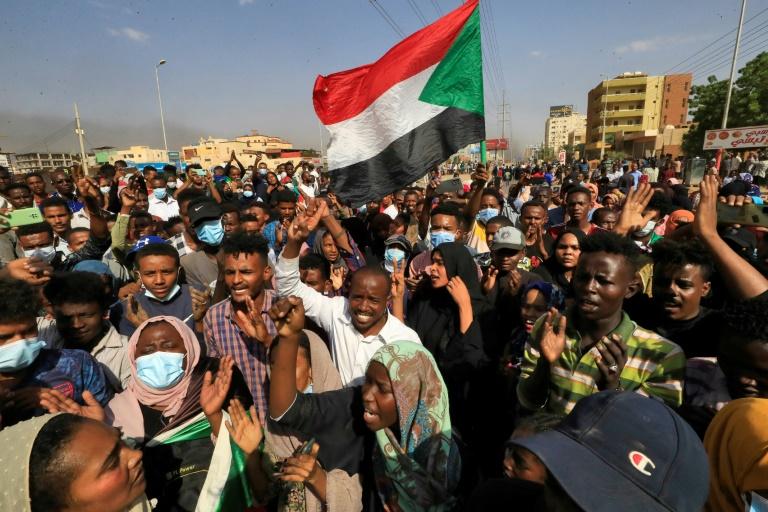
World Opinions /theguardian / Agencies contributed to this report




 World Opinions Débats De Société, Questions, Opinions et Tribunes.. La Voix Des Sans-Voix | Alternative Média
World Opinions Débats De Société, Questions, Opinions et Tribunes.. La Voix Des Sans-Voix | Alternative Média

